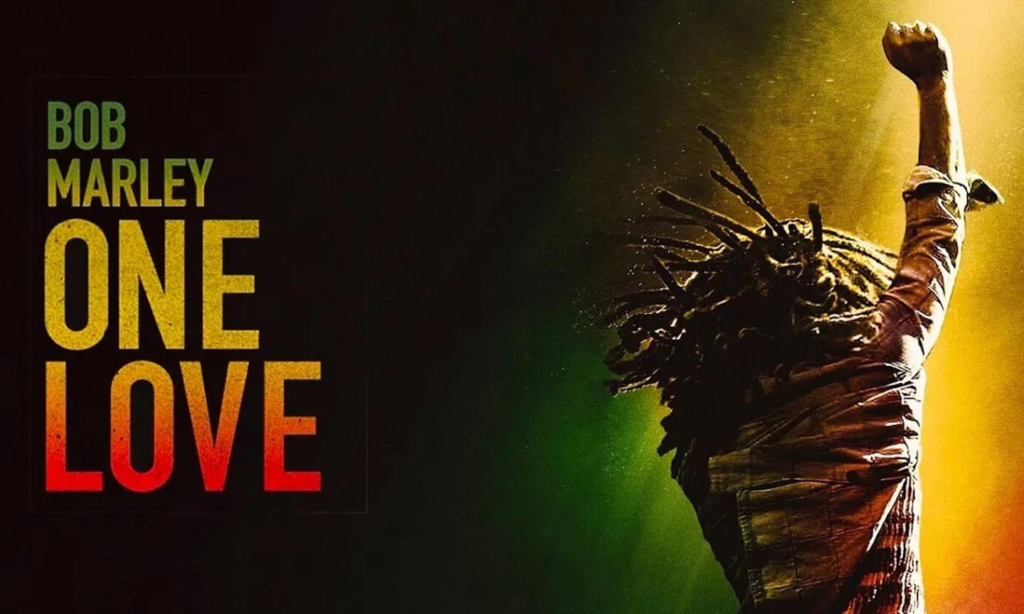
“Bob Marley: One Love” was a tribute to the music, culture and legacy that Bob Marley utilized to bring together the Jamaican community and individuals worldwide.
The production follows Bob Marley and the Wailers at what most consider the peak of their career, following up to the release of their album, “Exodus,” and his passing in 1981.
The movie delves into the turbulent years of 1976 to 1978, focusing on his band’s efforts to promote unity in Jamaica amid civil unrest. The plot follows critical events such as the attack on Marley’s compound, his relocation to London and internal struggles with relationships while grappling with corruption in his country.
Marley’s music was deeply influenced by his friendship with elder Mortimer Planno, who introduced him to the teachings of Rastafarianism. Marley’s songs often focused on themes of unity, equality and celebrating African culture, reflecting his beliefs in social justice and spiritual enlightenment.
Growing up, Marley had a very rough and complex childhood, which would shape his unifying and ever-longing spirit. Being a biracial man before even knowing what that meant while also only being raised by a poor, single mother in Jamaica and living in a country with civil unrest at the time had a significant impact on Marley’s life.
Marley found solace in music and began singing and playing the guitar at a young age. He drew inspiration from his surroundings and the struggles of the people in his community, which would later influence his music and message of peace and love.
The plot circles Marley’s journey as he and his band move from Jamaica to London for their safety following a near-fatal shooting at the Marley residence. Once there, we see Marley’s personal, internal and musical progression as he pulls influence from British punk rock to draw a connection to his Rastafarian culture, as they are both outcasts from society.
This film provides an emotional outlook, viewing the journey of the reggae legend during a crucial period. Rather than a traditional biopic focusing on the events of his life, the movie explores the far-reaching effects of his music and presence on the world.
Travis Merritts Jr., a junior health science major from Florence, South Carolina, shared a similar sentiment.
“Writing a film about someone so deeply composited can show itself in many different ways,” he said. “A movie written about his [Bob Marley’s] life could be about love, determination, impact, hardship, solitude and so much more. This is just one of unification.”
Kingsley Ben-Adir, who played Marley in the film, beautifully showcases Bob’s manifested lifestyle as a direct response to the uncertainty and solitude he would face as a child.
During specific scenes throughout the movie, his younger self would appear in a crop field, surrounded by fire with no escape—an accurate representation of his childhood.
As the plot progresses, this circle slowly closes in on him until the end. Finally, a man saves him from the fire and rides away with him on his horse, symbolizing his escape from his troubled past.
The movie highlights Bob’s dedication to unity through his relationships with others, showing how they help him overcome his inner struggles. Its centralized focus on interconnectedness left little room for the two things Marley kept close to him, Rastafarianism and Rita, leaving scant space to explore his multifaceted relationship with both.
Rita Marley, played masterfully by Lashanda Lynch, shared a complex relationship of love, loyalty and turbulence with Marley.
As he conceived multiple kids outside of their marriage and various incidents of infidelity, they remained devoted to each other, with Rita standing by Bob through his struggles with illness and addiction.
Their relationship was deepened by their shared commitment to Rastafarianism, social activism and Rita’s active role as a singer and manager for his career.
Director Reinaldo Green skillfully avoids placing Marley’s heroism at the forefront, instead focusing on the powerful connection his music and artwork provide. This approach results in a captivating plot filled with a suspenseful build-up toward the profound impact of his message.
“If we tried to tell Bob’s whole life from cradle to grave, we’d be dead in the water. I just wanted to shape a moment in time so we could get closer to knowing all that he went through,” Green said.
Throughout Green’s cinematic portrayal, Marley becomes the ultimate symbol of hope and inspiration, channeling resilience and determination in the fight for freedom.
“Bob came from the streets; he was the kid who was never supposed to make it, and he did. He worked hard and endlessly with a stoicness- a common ‘bredrin.’ That type of fight and inspiration is something that helps me get up in the morning,” he said.
This production did a fantastic job of embodying Marley’s essence and going through crucial concepts that pieced together all the work and progression he fought for.
What the film lacks in specificity, it makes up for in cinematography, acting and authenticity. Despite not being a biopic, this film effectively embodies the main mantra of the legendary talent.
Copy edited by Jalyn Lovelady



